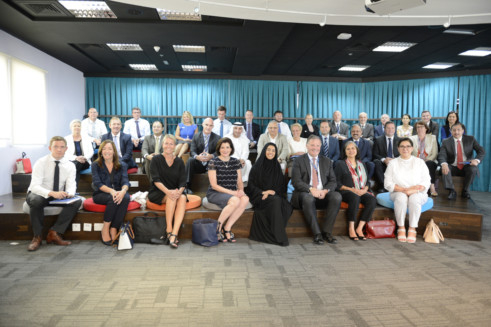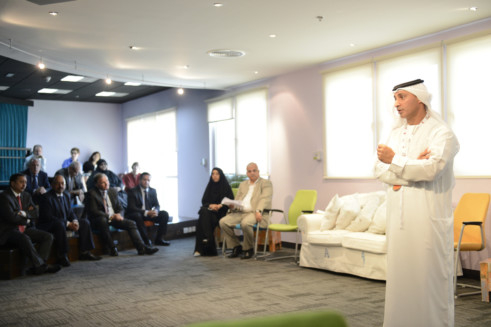
Dubai: ‘Outstanding’ and ‘Very Good’ Dubai schools will be allowed to opt out of the regular inspections if they choose a “differentiated inspection” based on self-evaluation and sharing excellence with other schools, it was announced on Monday.
The option is part of a new initiative of the Knowledge and Human Development Authority (KHDA), whose Dubai School Inspection Bureau (DSIB) rates schools Outstanding, Very Good, Good, Acceptable, Weak and Very Weak, based on annual inspections.
The KHDA discussed the arrangement with school principals during a meeting on Sunday regarding the Abundance Group initiative.
For the first time since inspections began in 2008, Outstanding and Very Good schools who choose to participate in the initiative will be given the option of a differentiated inspection based on self-evaluation, “allowing them to focus their resources on giving back to other schools”, the KHDA said.
Out of the 149 schools inspected, there are currently 16 outstanding and 13 very good schools.
The Abundance Group project will see “mutually beneficial, long-term learning partnerships established between schools”.
It is understood that high-achieving schools will share their expertise in various areas, such as language skills or prudent management, with schools that stand to gain from such practices.
Sir Christopher Stone, Chief Education Officer, GEMS Education, said: “The KHDA’s Abundance Group initiative is an innovative programme that will help Dubai’s schools continue to improve through greater collaboration. We at GEMS will support any initiative that works to improve the education sector, in support of the UAE National Agenda, Dubai Future Agenda and the overarching Dubai Expo 2020 theme of ‘connecting minds, creating the future.”
More details are expected to be announced at a later stage. Schools wishing to participate in Abundance Group projects will be invited to attend a “design-thinking session” at the start of the next academic year in September.
Meanwhile, self-evaluation has been part of the inspection system since the beginning. All schools have been required to submit a Self-Evaluation Form and School Improvement Plan with supporting documents and evidence.
Commenting on the new option, Dr Abdullah Al Karam, chairman of the board of directors and director-general of KHDA, said: “At this stage, we believe it is essential to map out a different way forward; a smarter approach that makes good use of the abundant knowledge, skills and talents our schools have, and enables them to share these with others in Dubai.”
He added: “We are confident that schools in Dubai will continue to improve in future, and we trust in the commitment to excellence that our highest achieving schools have shown.”
Dubai schools have been improvingly steadily since inspections began and witnessed the greatest improvement in the latest cycle. The number of schools that have been rated good or better has risen to 29 in 2015-16, up from four in 2008-09.
It means 61 per cent of students currently in schools rated ‘good’ or higher. This represents an eight per cent jump – the highest year-on-year improvement – in pupils attending good or better schools since the last academic year (2014-1015).
Previously, such annual improvements were limited to only two to three per cent, on average.
School inspections – a new way forward
Schools in Dubai have heaved a sigh of relief after they were presented an option to skip the gruelling annual Knowledge and Human Development Authority’s (KHDA’s) annual inspection.
Of the multi-curriculum schools that attended a recent meeting at the KHDA headquarters, those with outstanding or very good rating can skip the annual school inspections and still have their status maintained for one year. A total of 29 scools received top ratings.
Sources from the Dubai academic sector told Gulf News that schools with the top ratings have been given the option of self-evaluation. “This is only an option. So schools who do not approve of the option can go ahead and allow the regular KHDA inspection. However, those who do agree to this option will basically have to rate themselves on Dubai School Inspection Bureau (DSIB)’s Self Evaluation Form (SEF). This form has printed and specific criteria and the schools can rate themselves on where they rate themselves on each departmental performance and send the form to KHDA. The rating will continue to be valid for the entire annual year without the inspection. However, if the authorities find the schools lacking on any front then they will disregard that form and continue to go ahead with the inspection.”
Most outstanding and very good rated schools are expected to opt for self-evaluation as it is likely take the pressure off the teachers and also get them to be consistently good on a voluntary basis, say academicians. School teachers are known to feel under pressure with the onset of external inspections.
KHDA’s newly setup Abundance Group refers, according to the source, to schools with high ratings that have everything in abundance and which will be donated in kind as replacement from the “inspection holiday”.
“What that compensation will be decided at the next meeting which is likely to be held when schools open in the next term, around September 6,” said the source.
By Suchitra Bajpai Chaudhary, Senior Reporter
Latest school inspections (2015-16 academic year)
- 149 schools inspected
- 16 outstanding
- 13 very good
- 57 good
- 56 acceptable
- 7 weak (no schools rated very weak)
- 61 per cent of students now in schools rated ‘good’ or higher, compared to just 30 per cent in the 2008-9 school year













